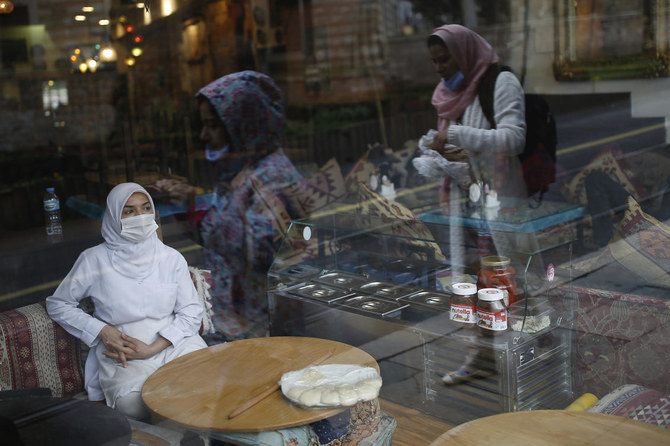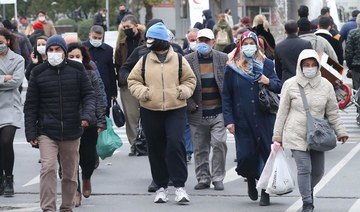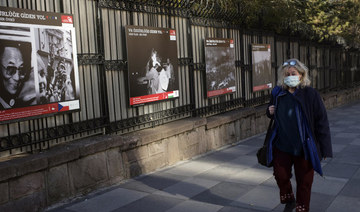ANKARA, Turkey: When Turkey changed the way it reports daily COVID-19 infections, it confirmed what medical groups and opposition parties have long suspected – that the country is faced with an alarming surge of cases that is fast exhausting the Turkish health system.
In an about-face, President Recep Tayyip Erdogan’s government this week resumed reporting all positive coronavirus tests – not just the number of patients being treated for symptoms – pushing the number of daily cases to above 30,000. With the new data, the country jumped from being one of the least-affected countries in Europe to one of the worst-hit.
That came as no surprise to the Turkish Medical Association, which has been warning for months that the government’s previous figures were concealing the graveness of the spread and that the lack of transparency was contributing to the surge. The group maintains, however, that the ministry’s figures are still low compared with its estimate of at least 50,000 new infections per day.
No country can report exact numbers on the spread of the disease since many asymptomatic cases go undetected, but the previous way of counting made Turkey look relatively well-off in international comparisons, with daily new cases far below those reported in European countries including Italy, Britain and France.
That changed Wednesday as Turkey’s daily caseload almost quadrupled from about 7,400 to 28,300.
The country’s hospitals are overstretched, medical staff are burned out and contract tracers, who were once credited for keeping the outbreak under check, are struggling to track transmissions, Sebnem Korur Fincanci, who heads the association, told The Associated Press.
“It’s the perfect storm,” said Fincanci, whose group has come under attack from Erdogan and his nationalist allies for questioning the government’s figures and its response to the outbreak.
Even though the health minister has put the ICU bed occupancy rate at 70 percent, Ebru Kiraner, who heads the Istanbul-based Intensive Care Nurses’ Association, says intensive care unit beds in Istanbul’s hospitals are almost full, with doctors scrambling to find room for critically ill patients.
There is a shortage of nurses and the existing nursing staff is exhausted, she added.
“ICU nurses have not been able to return to their normal lives since March,” she told the AP. “Their children have not seen their mask-less faces in months.”
Erdogan said, however, there was “no problem” concerning the hospitals’ capacities. He blamed the surge on the public’s failure to wear masks, which is mandatory, and to abide by social distancing rules.
Demonstrating the seriousness of the outbreak, Turkey last month suspended leave for health care workers and temporarily banned resignations and early retirements during the pandemic. Similar bans were also put in place for three months in March.
The official daily COVID-19 deaths have also steadily risen to record numbers, reaching 13,373 on Saturday with 182 new deaths, in a reversal of fortune for the country that had been praised for managing to keep fatalities low. But those record numbers remain disputed too.
Istanbul Mayor Ekrem Imamoglu said 186 people had died of infectious diseases in the city on Nov. 22 – a day on which the government announced just 139 COVID-19 deaths for the whole of the country. The mayor also said around 450 burials are taking place daily in the city of 15 million compared with the average 180-200 recorded in November the previous year.
“We can only beat the outbreak through a process that is transparent,” said Imamoglu, who is from Turkey’s main opposition party. “Russia and Germany have announced a high death toll. Did Germany lose its shine? Did Russia collapse?”
Health Minister Fahrettin Koca has rejected Imamoglu’s claims, saying: “I want to underline that all of the figures I am providing are accurate.”
Last week, Erdogan announced a series of restrictions in a bid to contain the contagion without impacting the already weakened economy or business activity. Opposition parties denounced them as “half-baked.” He introduced curfews for the first time since June, but limited them to weekend evenings, closed down restaurants and cafes except for takeout services and restricted the opening hours of malls, shops and hairdressers.
Both Fincanci and Kiraner said the measures don’t go far enough to contain transmissions.
“We need a total lockdown of at least two weeks, if not four weeks which science considers to be the most ideal amount,” Fincanci said.
Koca has said that the number of seriously ill patients and fatalities is on the rise and said some cities including Istanbul and Izmir are experiencing their “third peak.”
Turkey would wait, however, for two weeks to see the results of the weekend curfews and other restrictions before considering stricter lockdowns, he said.
Turkey’s new coronavirus figures confirm experts’ worst fears
https://arab.news/2vp7p
Turkey’s new coronavirus figures confirm experts’ worst fears

- Turkish Medical Association has been warning for months that the government’s previous figures were concealing the graveness of the spread
Gaza baby rescued from dead mother’s womb dies

- Doctors were able to save the baby, delivering her by Caesarean section
- The baby suffered respiratory problems and a weak immune system, said Doctor Mohammad Salama who had been caring for Sabreen Al-Rouh
RAFAH, Gaza Strip: A baby girl who was delivered from her dying mother’s womb in a Gaza hospital following an Israeli airstrike has herself died after just a few days of life, the doctor who was caring for her said on Friday.
The baby had been named Sabreen Al-Rouh. The second name means “soul” in Arabic.
Her mother, Sabreen Al-Sakani (al-Sheikh), was seriously injured when the Israeli strike hit the family home in Rafah, the southernmost city in the besieged Gaza Strip, on Saturday night.
Her husband Shukri and their three-year-old daughter Malak were killed.
Sabreen Al-Rouh, who was 30-weeks pregnant, was rushed to the Emirati hospital in Rafah. She died of her wounds, but doctors were able to save the baby, delivering her by Caesarean section.
However, the baby suffered respiratory problems and a weak immune system, said Doctor Mohammad Salama, head of the emergency neo-natal unit at Emirati Hospital, who had been caring for Sabreen Al-Rouh.
She died on Thursday and her tiny body was buried in a sandy graveyard in Rafah.
“I and other doctors tried to save her, but she died. For me personally, it was a very difficult and painful day,” he told Reuters by phone.
“She was born while her respiratory system wasn’t mature, and her immune system was very weak and that is what led to her death. She joined her family as a martyr,” Salama said.
More than 34,000 Palestinians, many of them women and children, have been killed in the six-month-old war in Gaza between Israel and Hamas militants, according to the Gaza health ministry. Israel denies deliberately targeting civilians in its campaign to eradicate Hamas.
Much of Gaza has been laid to waste by Israeli bombardments and most of the enclave’s hospitals have been badly damaged, while those still operating are short of electricity, medicine sterilization equipment and other supplies.
“(Sabreen Al-Rouh’s) grandmother urged me and the doctors to take care of her because she would be someone that would keep the memory of her mother, father and sister alive, but it was God’s will that she died,” Salama said.
Her uncle, Rami Al-Sheikh Jouda, sat by her grave on Friday lamenting the loss of the infant and the others in the family.
He said he had visited the hospital every day to check on Sabreen Al-Rouh’s health. Doctors told him she had a respiratory problem but he did not think it was bad until he got a call from the hospital telling him the baby had died.
“Rouh is gone, my brother, his wife and daughter are gone, his brother-in-law and the house that used to bring us together are gone,” he told Reuters.
“We are left with no memories of my brother, his daughter, or his wife. Everything was gone, even their pictures, their mobile phones, we couldn’t find them,” the uncle said.
UN denounces ‘more serious’ Iran crackdown on women without veils

- Hundreds of businesses including restaurants and cafes have been shut down for not enforcing the hijab rule
- More women began refusing the veil in the wake of the 2022 death in custody of 22-year-old Mahsa Amini
GENEVA: The United Nations said Friday that it was concerned by reports of new efforts to track and punish Iranian women, some as young as 15, who refuse to wear the headscarf required under the country’s Islamic law.
The UN Human Rights Office also expressed alarm about a draft bill on “Supporting the Family by Promoting the Culture of Chastity and Hijab,” which would impose tougher sentences on women appearing in public without the hijab.
“What we have seen, what we’re hearing is, in the past months, that the authorities, whether they be plainclothes police or policemen in uniform, are increasingly enforcing the hijab bill,” Jeremy Laurence, a spokesman for the office, said at a press conference.
“There have been reports of widespread arrests and harassment of women and girls — many between the ages of 15 and 17,” he said.
Iranian police announced in mid-April reinforced checks on hijab use, saying the law was increasingly being flouted.
Hundreds of businesses including restaurants and cafes have been shut down for not enforcing the hijab rule, and surveillance cameras are being used to identify women without it, Laurence said.
More women began refusing the veil in the wake of the 2022 death in custody of 22-year-old Mahsa Amini after her arrest by Iran’s morality police for allegedly breaking the headscarf law, which sparked a wave of deadly protests against the government.
Laurence said that on April 21, “the Tehran head of the Islamic Revolutionary Guard Corps announced the creation of a new body to enforce existing mandatory hijab laws, adding that guard members have been trained to do so ‘in a more serious manner’ in public spaces.”
And while the latest draft of the new hijab bill has not been released, “an earlier version stipulates that those found guilty of violating the mandatory dress code could face up to 10 years’ imprisonment, flogging, and fines,” he said, adding that “this bill must be shelved.”
The Human Rights Office also called for the release of a rapper sentenced to death for supporting nationwide protests sparked by Amini’s death.
Toomaj Salehi, 33, was arrested in October 2022 for publicly backing the uprising.
“All individuals imprisoned for exercising their freedom of opinion and expression, including artistic expression, must be released,” Laurence said.
UN seeks to deescalate Sudan tensions amid reports of possible attack

- UN Secretary-General Antonio Guterres’ envoy is engaging with all parties to deescalate tensions
UNITED NATIONS: The United Nations is increasingly concerned about escalating tensions in Al-Fashir in Sudan’s North Dafur region amid reports that the Rapid Support Forces are encircling the city, signaling a possible imminent attack, the UN’s spokesperson said on Friday.
UN Secretary-General Antonio Guterres’ envoy is engaging with all parties to deescalate tensions in the area, the spokesperson said.
Israeli army says missile fire kills civilian near Lebanon

- The violence has fueled fears of all-out conflict between Iran-backed Hezbollah and Israel
- “Overnight, terrorists fired anti-tank missiles toward the area of Har Dov in northern Israel,” the Israeli army said
JERUSALEM: The Israeli army said Friday a civilian was killed near the country’s northern border with Lebanon, as near-daily exchanges of fire with Hezbollah rage.
Both sides have stepped up attacks this week, with Hezbollah increasing rocket fire and Israel saying it had carried out “offensive action” across southern Lebanon.
The violence has fueled fears of all-out conflict between Iran-backed Hezbollah and Israel, which last went to war in 2006.
“Overnight, terrorists fired anti-tank missiles toward the area of Har Dov in northern Israel,” the Israeli army said, referring to the disputed Shebaa Farms district.
“As a result, an Israeli civilian doing infrastructure work was injured and he was later pronounced dead.”
Israeli media reported that the victim was an Arab-Israeli truck driver. Police told AFP they had not identified the body, but said it was the only one found after a truck was hit.
Hezbollah said it had destroyed two Israeli vehicles in the Kfarshuba hills overnight in a “complex ambush” on a convoy using missiles and artillery.
The Israeli army did not comment directly on the claim.
It said Israeli fighter jets struck Hezbollah targets around Shebaa village in southern Lebanon including a weapons store and a launcher, while soldiers “fired to remove a threat in the area.”
It said fighter jets also “struck Hezbollah operational infrastructure in the area of Kfarshuba and a military compound in the area of Ain El Tineh in southern Lebanon.”
Lebanon’s official National News Agency reported that Shebaa village, Kfarshuba and Helta were targeted by “more than 150 Israeli shells,” leaving homes damaged.
Iran-backed Hezbollah has been trading almost-daily fire with the Israeli army since the day after its Palestinian ally Hamas carried out an unprecedented attack on Israel on October 7.
Since October 8 at least 380 people have been killed in Lebanon, including 252 Hezbollah fighters and dozens of civilians, according to an AFP tally.
Israel says 11 soldiers and nine civilians have been killed on its side of the border.
Tens of thousands of people have been displaced on both sides.
EU commits $73 million more for Gaza aid

- New EU aid would be focused on food deliveries, clean water, sanitation and shelters
- The EU and United States have demanded that Israel allows more aid into Gaza
BRUSSELS: The European Union on Friday said it was giving an extra 68 million euros ($73 million) to provide desperately needed aid to Palestinians in Gaza.
The territory has been devastated by more than six months of Israeli bombardment and ground operations after Hamas’s October 7 attack, leaving the civilian population of two million people in need of humanitarian assistance to survive.
“In light of the continued deterioration of the severe humanitarian crisis in Gaza, and the steady rise of needs on the ground, the (European) Commission is stepping up its funding to support Palestinians affected by the ongoing war,” an EU statement said.
“This support brings total EU humanitarian assistance to 193 million euros for Palestinians in need inside Gaza and across the region in 2024.”
The EU said the new aid would be focused on food deliveries, clean water, sanitation and shelters, and would be channelled through local partners on the ground.
The United Nations has said Israel’s operation has turned Gaza into a “humanitarian hellscape,” amid fears of a looming famine.
The EU and United States have demanded that Israel allows more aid into Gaza.
The US military said on Thursday it had begun construction of a pier meant to boost deliveries to the territory.
The war in Gaza began with an unprecedented Hamas attack on Israel on October 7 that resulted in the deaths of about 1,170 people in Israel, according to an AFP tally of Israeli official figures.
Israel vowed to destroy Hamas, with a retaliatory offensive that has killed at least 34,356 people in Gaza, mostly women and children, according to the Hamas-run territory’s health ministry.






















